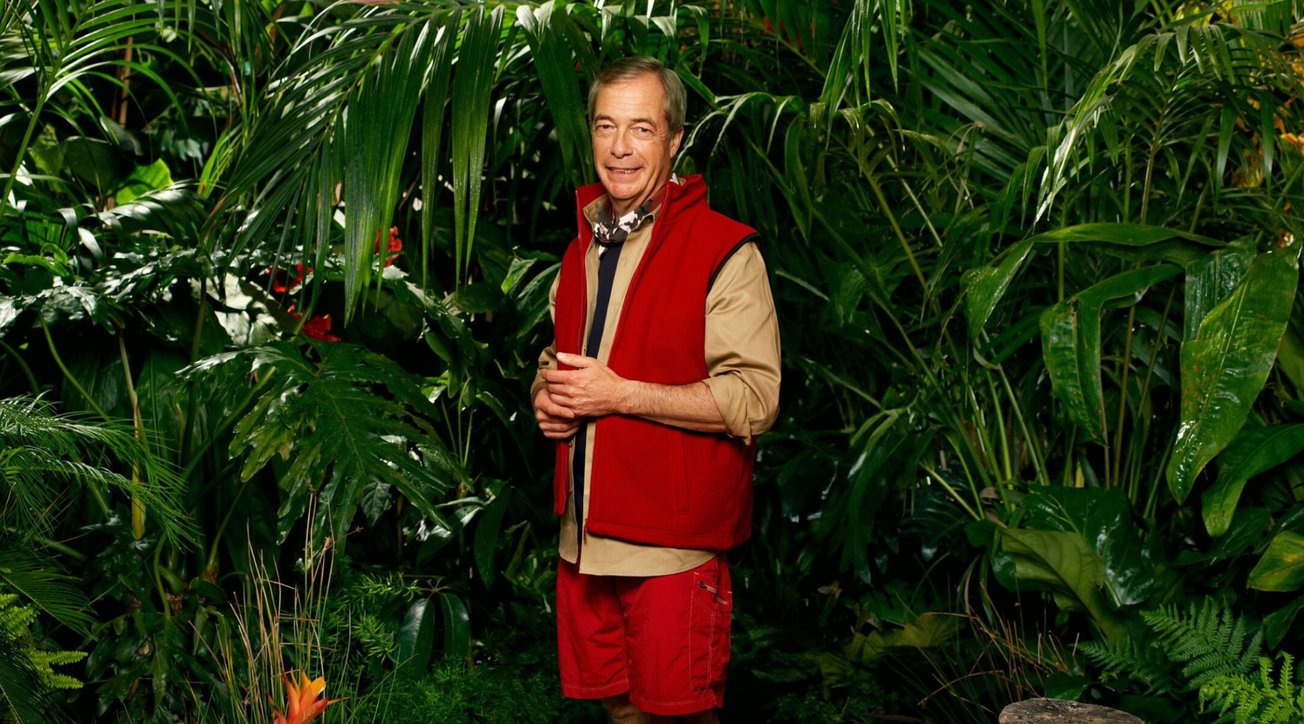By Lucy Canning, Third Year, English
Nigel Farage’s ‘guerrilla’ tactics won him the 2016 Brexit referendum, and they will certainly see him right at home in the jungle. Farage’s most recent venture into the spotlight sees him seemingly ‘baring all’, figuratively and (unfortunately) literally, to the British public on ‘I’m A Celebrity’ as he participates in gruesome trials and consents to have his every movement televised. The self-professed attempt to “reach a new audience” by humanising himself through reality TV is symptomatic of a growing populism in our politics, in which the politician as a celebrity is an indispensable figure. How has Farage reached his newfound celebrity status, and to what end?
With seven failed attempts to become an MP under his belt, Farage has learned a valuable lesson; when unshackled to constituents and surgeries, his ability to campaign to a larger proportion of the UK population increases tenfold and, notably, without the accountability a parliamentary position would demand. But under-the-radar politics have never been Farage’s style. In 2018, Farage founded populist right-wing party Reform UK, previously known as the Brexit Party, before stepping down to Honorary President in 2021. However, for the self-styled political insurgent, stepping down does not mean stepping out of the limelight.
He also presents a prime-time show on GB News, a controversial television channel which has come under fire a dozen times for breaching Ofcom’s impartiality rules and gives a platform to right-wing, sometimes hard-right, ‘presenters’ including Jacob Rees-Mogg, vicar Calvin Robinson, and (until recently) Laurence Fox. Interestingly, their website currently has a section strictly dedicated to ‘I’m A Celeb!’, running articles that impartially feature Farage in 99% of the headlines, alongside a ‘’Make Nigel King of the Jungle” campaign featuring in their news bulletin (in which ‘Nigel’ points to camera in a feeble “We Want You… to vote for me” parody).
Nigel survives again. ✅
— Nigel Farage (@Nigel_Farage) December 8, 2023
Thank you, and keep voting! 🇬🇧 pic.twitter.com/QyxHZF9syR
The ‘Vote Nigel’ campaign continues on his X (formally known as Twitter) account where retweets of supportive accounts are fired out so efficiently one must imagine his teams deep in the app's trenches, one gangrenous with trench-thumbs and another reloading ammunition made up of buzzwords (‘haters’ and ‘remainers’ spring to mind) and Union Jack emojis.
One might think that appearing on a celebrity reality show might force him so far into the realm of the cartoonish caricature that, when the end-of-series feast is brought out, he might suddenly lift off the ground and float towards the smell. Of course, the ‘cartoonification’ of the politician is a longstanding tradition in British politics whereby pictorial satire can serve to criticise those depicted. The danger is that the public begins to see the ‘character’ created rather than the politician and their views and policies. This is an increasingly substantial threat in the age of social media, where images of unkempt hair or unflattering stills circulate almost instantly and entrench the image of ‘bumbling’ or ‘awkward’ politicians. This X user comments “at least Matt Hancock was funny” like “an awkward dad on holiday who wears socks and sandals”, rather than remembering the outrage which first met his appearance on the show.
Certainly, image and its potential for propagation are a compelling theme in far-right and populist politics. The Netherland’s Geert Wilders sports a shocking platinum dye-job which has attracted much press over his career has earned him the nickname of ‘Dutch Donald Trump’. Argentina’s current president Javier Milei, too, has recently been nicknamed ‘the Wig’. He is currently proposing a referendum on the legality of abortion and does not believe in climate change.
Outside of regulated and academic sectors, the readily circulated images of these politicians’ appearances gain as much conversation as that of their policies. That they represent (often tendentious) belief systems, constituents and even entire countries is buried beneath a landslide of synecdochical references which concentrate on them as an individual, rather than the face of wider political movements. Entrenched within the cultural imagination through their visual branding, they become a celebrity.
The danger in this case, of which Farage is both aware and keen to make use of, is that resolutely completing a bushtucker trial can serve as a proxy for actual political achievement and earn the public’s respect. He's talked openly about wanting the "25% of the airtime” which comes with being voted to do the trials. Richard Tice (leader of Reform UK) commented in a recent interview that Farage is “gaining support, gaining enthusiasm. He’s showing calm solid leadership… whilst others around him are screaming at the sight of the odd snake or the odd rat.” Reform UK have risen in voting intention polls from 2% in 2019 to a current 11%, gaining three points since Farage entered the jungle.

A figure who both embodies and engenders the British public’s most emotive anxieties, Farage does not need everyone to like him. Even those who actively dislike him can further his cause by mocking him online, sharing his photo and simply talking about him. As Andrew Kamons notes in his article on ‘Celebrity and Politics’, when “the party system is weak and politics personalized, celebrity often carries more weight.” Faced with a general election in which Labour may simply win by default, and where populist parties such as Reform UK are becoming a real option, we may well see more politicians turning to the celebrity world to bolster their political status.
Featured Image: ITV/Shutterstock
How do you feel about Nigel Farage in the jungle? Let us know @epigrampaper









